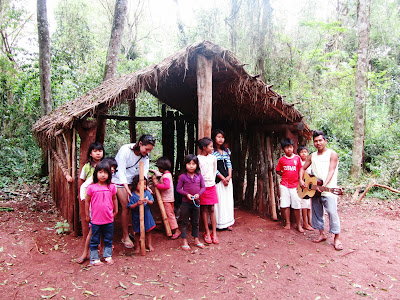This past weekend CEA took us on a wonderful trip to Misiones, Argentina. It's a state in Northeast Argentina, touching both Brazil and Paraguay.
 |
| Misiones, Argentina : the itty bitty red province |
Walking out of the airplane and seeing the jungle that surrounded me, immediately I felt my heart whisper "this is the Latin America I know".
I love my big city experience of Buenos Aires, but I felt so at home in Misiones, Argentina. I looked much more like the Latin America I grew up around. Every sight, smell, and touch I experienced was both new and familiar at the same time.
Day 1: Haras Rancho Lodge
We had a huge lunch that consisted of meat, meat, and some more meat. I've discovered of all the parts of the Asado, blood sausage is my least favorite. My favorite part of the Asado is the Asado de tira, which is basically short ribs.
After lunch we ventured around the ranch, discovering what it all had to offer. Maia and I entered the owners home which was absolutely breath taking. It was the home of my dreams. It really reminded me of the carpentry my dad is famous for. I thought perhaps my dad could recreate the masterpiece, but then again he would make it his own. Walking around and touching all the furniture I promised the owner I would be coming back some day in the future.
Of course the moment I saw the horses I knew I just HAD to ride on one. One of the ranch-hands, Luis, introduced me to my newest friend, Gringa. Her name is quite humorous because a Gringo is a term Latin Americans use to describe white people. Gringa is white with blond hair, and I too am called Gringa by my friends in Mexico (I may be brown, but I'm still American!) We instantly bonded as I showered her in compliments. She was very well behaved during our ride, always wanting to be ahead of the pack: just like me! The ranch hands were pretty humored by how enamored I had become of her.
One of my favorite things about being in the countryside is the tranquility. There's a really good reason why city people can't make it in the countryside: they don’t know how to embrace silence. Once you embrace silence, you can learn how to listen.
Day 2: Iguazu Falls
I honestly have no words for Iguazu Falls. Unfortunately my camera battery had died in the morning and I didn't get to take any pictures there. Even if I had it, my photos would have done no justice to this natural wonder.Here is a photo of Iguazu I stole from the internet, but even this photo fails to capture what Iguazu has to offer.
I did get the opportunity to be in Brazilian territory for this part of the trip, naturally I was I riding cloud nine. We took a boat that took us right up to the waterfall and Iguazu literally showered us in it's presence. Again, words cannot describe what it was like so I'm not even going to try.
Day 3: Guarani Village Tour
The Guarani are a group of culturally related Indigenous people of South America. They mostly reside in Paraguay, Argentina, Brazil, and Bolivia. Although their population was hindered during exploration and colonization, the people and the culture persist. They speak their own language and they have no written history. The Guarani continue their legacy through their way of life and song. Their tongue is the binding characteristic of their culture.I held off posting pictures of them because before I do I want you to take off the western eyes you view the world through.
While the Guarani people do not live in the same luxuries you do, these people are not poor. The Guarani are a rich people with a rich culture. I don't want you to pity them.
This website I found describes my sentiments of the Guarani people perfectly:
Along the last 500 years, the Guarani people have created and recreated their resistance strategies, sometimes facing military forces, like the imperial armies of Spain and Portugal, sometimes finding allies in the involving society, and sometimes simply being dispersed.
Against all these forms of dominance (educational, military, economical and religious), the Guarani were able to maintain their spirit free by using as a shield of protection the uninterrupted process of transmitting their language and culture from generation to generation and having as their principal arm the philosophy of the Search for the Land Without Evils.
“This free land, independent and sovereign, has to be based on the fundamental indigenous beginnings. Beginnings that overcome the personal interests and transcend and embrace the social, economic, cultural and political spheres. These beginnings are the fundamental essence of being Guarani, as the incessant search of the Land Without Evils and of Freedom. But, who answers me? ... Nor God answers me when I will be free...!!! Our essence is of being without owner "... our God is the Nature and not the Law...". Beginnings that impregnate being social, like Mboroaiu, Mborerekua, Yoparareko, this love, esteem, affection, solidarity, expressed in feelings for the person close by, that allows to overcome and to come off of being mean and individualist.” -- Wilson Changaray
 |
| Ha'evete is "Thank you" in Guarani |
Con un fuerte abrazo,
Julietta



















